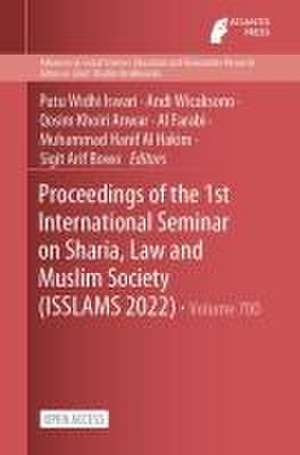Proceedings of the 1st International Seminar on Sharia, Law and Muslim Society (ISSLAMS 2022): Advances in Social Science, Education and Humanities Research, cartea 700
Editat de Putu Widhi Iswari, Andi Wicaksono, Qosim Khoiri Anwar, Al Farabi, Muhammad Hanif Al Hakim, Sigit Arif Bowoen Limba Engleză Paperback – 9 feb 2023
Din seria Advances in Social Science, Education and Humanities Research
-
 Preț: 309.17 lei
Preț: 309.17 lei -
 Preț: 533.52 lei
Preț: 533.52 lei -
 Preț: 393.92 lei
Preț: 393.92 lei -
 Preț: 383.07 lei
Preț: 383.07 lei -
 Preț: 387.48 lei
Preț: 387.48 lei -
 Preț: 418.54 lei
Preț: 418.54 lei -
 Preț: 410.06 lei
Preț: 410.06 lei -
 Preț: 385.51 lei
Preț: 385.51 lei -
 Preț: 401.59 lei
Preț: 401.59 lei -
 Preț: 408.44 lei
Preț: 408.44 lei -
 Preț: 378.66 lei
Preț: 378.66 lei -
 Preț: 464.26 lei
Preț: 464.26 lei -
 Preț: 404.03 lei
Preț: 404.03 lei -
 Preț: 390.04 lei
Preț: 390.04 lei -
 Preț: 406.07 lei
Preț: 406.07 lei -
 Preț: 411.29 lei
Preț: 411.29 lei -
 Preț: 371.89 lei
Preț: 371.89 lei -
 Preț: 420.11 lei
Preț: 420.11 lei -
 Preț: 391.15 lei
Preț: 391.15 lei -
 Preț: 410.48 lei
Preț: 410.48 lei -
 Preț: 389.51 lei
Preț: 389.51 lei -
 Preț: 376.64 lei
Preț: 376.64 lei -
 Preț: 403.21 lei
Preț: 403.21 lei -
 Preț: 459.23 lei
Preț: 459.23 lei -
 Preț: 395.97 lei
Preț: 395.97 lei -
 Preț: 388.29 lei
Preț: 388.29 lei -
 Preț: 376.64 lei
Preț: 376.64 lei -
 Preț: 432.86 lei
Preț: 432.86 lei -
 Preț: 385.51 lei
Preț: 385.51 lei -
 Preț: 469.81 lei
Preț: 469.81 lei -
 Preț: 370.71 lei
Preț: 370.71 lei -
 Preț: 379.20 lei
Preț: 379.20 lei -
 Preț: 374.71 lei
Preț: 374.71 lei -
 Preț: 464.06 lei
Preț: 464.06 lei -
 Preț: 405.26 lei
Preț: 405.26 lei -
 Preț: 445.81 lei
Preț: 445.81 lei -
 Preț: 400.77 lei
Preț: 400.77 lei -
 Preț: 387.89 lei
Preț: 387.89 lei
Preț: 392.36 lei
Nou
Puncte Express: 589
Preț estimativ în valută:
75.10€ • 78.27$ • 62.51£
75.10€ • 78.27$ • 62.51£
Comandă specială
Livrare economică 10-16 decembrie
Preluare comenzi: 021 569.72.76
Specificații
ISBN-13: 9782494069800
ISBN-10: 2494069807
Ilustrații: XI, 329 p. 9 illus.
Dimensiuni: 155 x 235 mm
Greutate: 0.53 kg
Ediția:1st ed. 2022
Editura: Atlantis Press SARL
Colecția Atlantis Press
Seria Advances in Social Science, Education and Humanities Research
Locul publicării:Paris, France
ISBN-10: 2494069807
Ilustrații: XI, 329 p. 9 illus.
Dimensiuni: 155 x 235 mm
Greutate: 0.53 kg
Ediția:1st ed. 2022
Editura: Atlantis Press SARL
Colecția Atlantis Press
Seria Advances in Social Science, Education and Humanities Research
Locul publicării:Paris, France
Textul de pe ultima copertă
This is an open access book. Wael B. Hallaq, a renowned sharia scholar, has called sharia an ‘episteme’ that suffered a ‘structural death’ following the dawn of modernity in the nineteenth and early twentieth centuries (Hallaq 2009, 15–16). Yet, its resurgent is remarkable across a number of jurisdictional fault-lines: from Muslim-majority nations in Middle East and Southeast Asia to Muslim-minority societies in Western Europe and North America. Across these jurisdictions, the relationship between sharia and state law is central. It includes sharia-state encounters, notably in the form of (state) Islamic law, in the field of family law, which is often asserted as the ‘core’ or ‘last stronghold’ of sharia (Moors 2003, 2; Coulson 1969, 115–6), and other substantive areas of law, such as Islamic economics and Islamic philanthropy and also jinayah (Islamic penal law). Regardless of their differences in their own specific context, these areas somehow manage to secure an importance place in the modern days. It involves different loci of authority to interpret, legislate, and enforce sharia, or parts of it that not only flourish but also being challenged around the Muslim world. Equally important are implications of the increasingly unsettled authority of apparently agreed-upon substance of sharia. To contribute on these issues, we would like to invite scholars from diverse discipline including law, anthropology, and Islamic studies, working in both Muslim-majority and Muslim-minority contexts, to present their works in our International Seminar on Sharia, Law, and Muslim Society (ISSLaMS).
Caracteristici
This book is open access, which means that you have free and unlimited access
New research
Contains select peer-reviewed papers of the conference
New research
Contains select peer-reviewed papers of the conference
